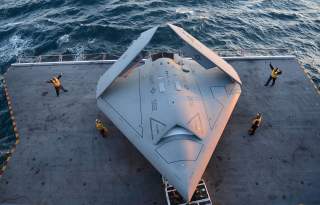You Can't Imagine World War III Between America and China
And the amount of blood that would be spilled.
With intelligence flooding the Kremlin about crippled American capacity, Moscow, still a close Chinese ally, sends a dozen Severodvinsk-class nuclear submarines beyond the Arctic Circle bound for permanent, provocative patrols between New York and Newport News. Simultaneously, a half-dozen Grigorovich-class missile frigates from Russia’s Black Sea fleet, escorted by an undisclosed number of attack submarines, steam for the western Mediterranean to shadow the U.S. Sixth Fleet.
Within a matter of hours, Washington’s strategic grip on the axial ends of Eurasia — the keystone to its global dominion for the past 85 years — is broken. In quick succession, the building blocks in the fragile architecture of U.S. global power start to fall.
Every weapon begets its own nemesis. Just as musketeers upended mounted knights, tanks smashed trench works, and dive bombers sank battleships, so China’s superior cyber capability had blinded America’s communication satellites that were the sinews of its once-formidable military apparatus, giving Beijing a stunning victory in this war of robotic militaries.
Without a single combat casualty on either side, the superpower that had dominated the planet for nearly a century loses World War III.
Alfred McCoy is the Harrington professor of history at the University of Wisconsin-Madison. He is the author of the now-classic book The Politics of Heroin: CIA Complicity in the Global Drug Trade, which probed the conjuncture of illicit narcotics and covert operations over 50 years, and the just-published In the Shadows of the American Century: The Rise and Decline of U.S. Global Power, from which this piece is adapted. This story originally appeared at TomDispatch.
This piece was published on War is Boring in 2017.
Image: Wikipedia.

